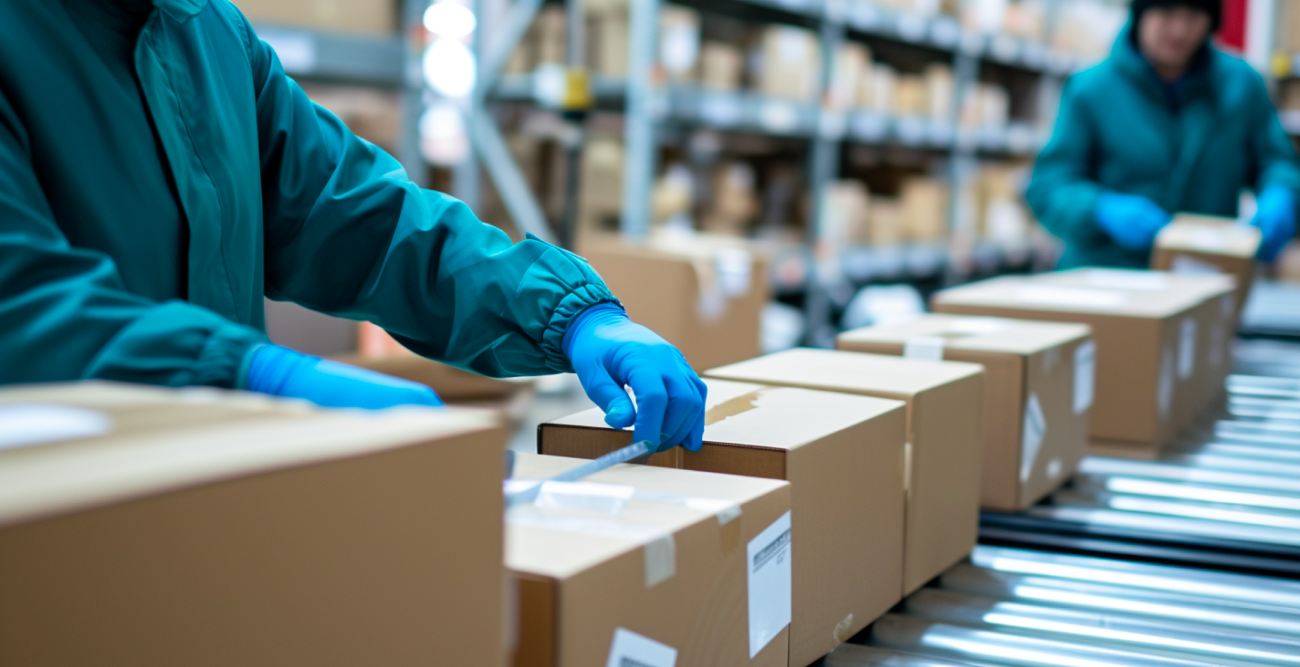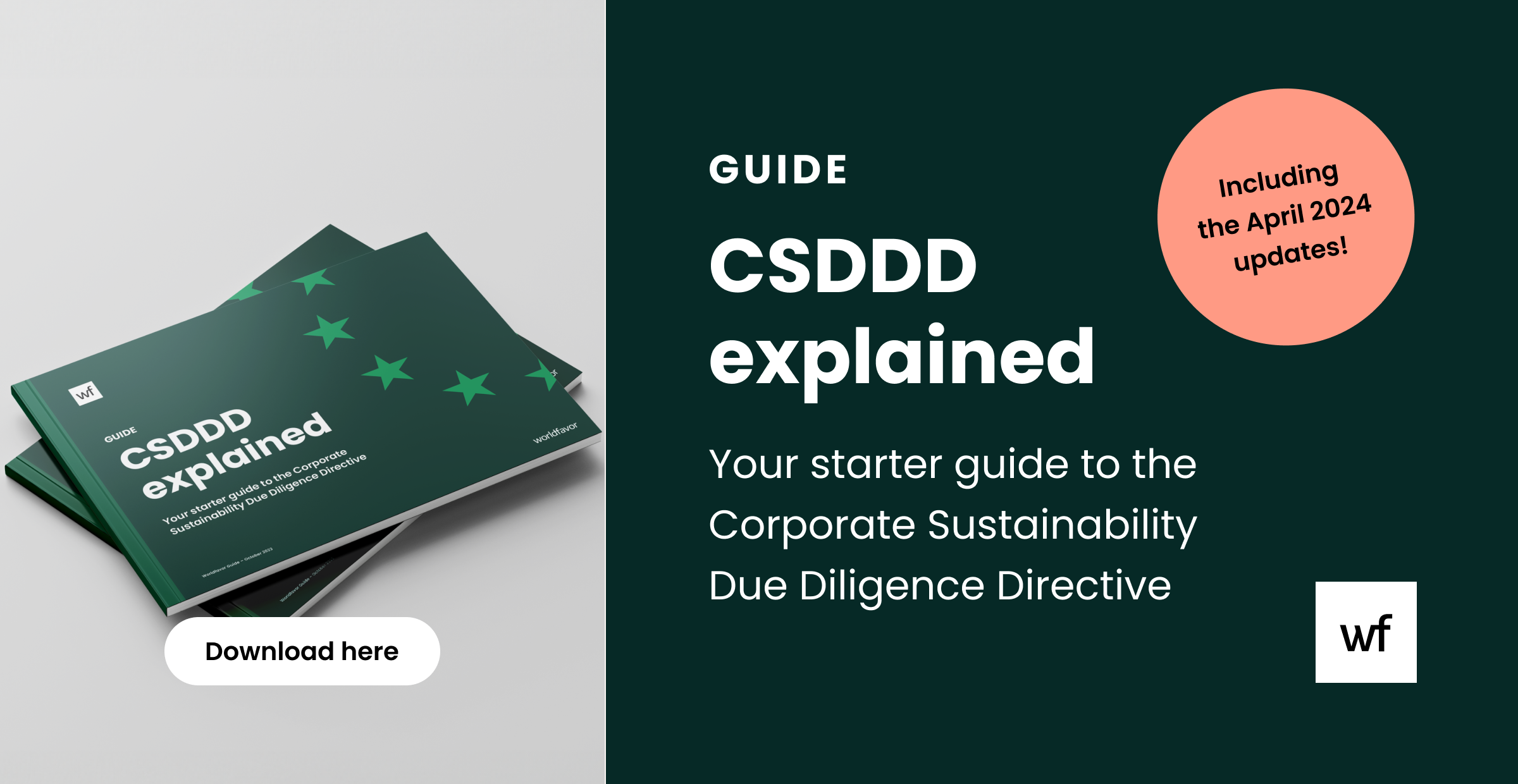The EU's Corporate Sustainability Due Diligence (CSDDD)
To make businesses take more responsibility for what is happening within their supply chain, the EU is adopting the Corporate Sustainability Due Diligence Directive (CSDDD). Find out what the directive is all about, who it will apply to, and how to get prepared for it.
Download our CSDDD guide to learn how to set up your CSDDD reporting process:

Updated: October 2024
The era of companies turning a blind eye to what's happening in their supply chains is coming to an end. In March 2024, the EU member states agreed to give a green light to the long-awaited Directive on Corporate Sustainability Due Diligence (CSDDD).
Once adopted, each member states will have two years to transpose the directive into national law. The directive will then start to apply to companies in a phase-in way from 2027 and onwards, starting with the largest companies.
In this blog, we'll go through everything you need to know about the EU's new CSDD directive: Is your organization within scope? What's expected of you? And what are the consequences of not complying in time?
What is the EU’s Directive on Corporate Sustainability
Due Diligence (CSDDD)?
The CSDDD aims to make companies operating in the EU more responsible for their social and environmental impacts. To achieve this, the proposed directive introduces rules for companies to carry out human rights and environmental due diligence (HREDD) – for their own operations and throughout their value chain.
Who does CSDDD apply to?
[new 2024 updates]
According to the most recent text, the CSDDD applies to:
- EU-based and parent companies with 1,000+ employees and a net worldwide turnover of over 450 million EUR.
- Non-EU companies with 1,000+ employees and if they generated a net turnover of at least 450 million EUR in the EU the previous financial year.
- Franchises with a turnover of over 80 million EUR if at least 22,5 million EUR was generated by royalties.
However, even companies outside CSDDD's direct focus should expect some impact – and prepare accordingly – since in-scope companies will most likely involve their smaller business partners in their due diligence processes.

What are the CSDDD's requirements?
The directive introduces a corporate due diligence duty to identify, prevent, bring to an end, mitigate and account for adverse human rights and environmental impacts in the company's own operations, its subsidiaries and their value chains.
In order to do so, companies have to conduct mandatory and continuous human rights and environmental due diligence aligned with the OECD due diligence guidelines:
Companies that the CSDDD targets will be required to execute the following steps:
- Integrate human rights and environmental due diligence into policies.
- Develop a process to identify and assess actual or potential adverse human rights and environmental impacts – both in own operations and in the supply chain.
- Prevent or mitigate potential impacts.
- Bring to an end or minimize actual impacts.
- Track the implementation and results to evaluate the effectiveness of due diligence procedures (at least once every 12 months).
- Publish an annual statement on your website to communicate the relevant due diligence measures taken during the previous calendar year.
- Establish and maintain a complaints procedure.
CSDDD timeline
2024: The EU votes on the final directive text on April 24th; if passed, the CSDDD will be enacted.
2024-2026: EU members states transpose CSDDD into national law.
2026/2027: CSDDD takes effect at national level.
From 2027: Companies with 5,000+ employees and a net turnover of 1 ,500 million EUR must comply.
From 2028: Companies with 3,000+ employees and a net turnover of 900 million EUR must comply.
From 2029: Companies with 1,000+ employees and a net turnover of 450 million EUR must comply.
What happens if you don’t comply in time?
Companies that fail to comply with the EU’s Corporate Sustainability Due Diligence risk being faced with a compliance order, or even large financial penalties based on the company’s turnover. These penalties include fines of up to 5% of companies’ net worldwide turnover.
This is largely to ensure effective compensation of victims of adverse impacts – and each member state is required to lay down rules governing the civil liability of companies for damages arising due to its failure to comply with the due diligence process.
How should you prepare for the CSDDD's requirements?
One the key requirements is for companies to implement human rights and environmental due diligence measures that cover their entire supply chain – not just their tier 1 suppliers. This includes suppliers, sub-suppliers, and other entities in the supply chain. This might add further complexity to your already-existing risk assessments and supply chain risk management, but at the end of the day, there are no shortcuts.
In-scope companies have no choice but to start taking full control over the actions in their supply chains if they haven’t already – or they may face severe penalties that could jeopardize the entire future of their business.
Get started with Worldfavor
Luckily – there is help to be had! Worldfavor is the leading global platform for organizations to connect with their suppliers to access the ESG data they need to ensure compliance with current and upcoming regulations. The platform helps you to access, analyze, and sync your supplier information with international standards (such as OECD guidelines), so you don’t have to spend valuable time chasing down the data you need. Sounds interesting? Talk to one of our experts today!
Related blog posts you might like:






%20as%20the%20deadline%20approaches.%20Learn%20about%20compliance%20requirements%2c%20potential%20delays%2c%20and%20key%20updates..png)

